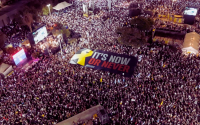Common Dreams / Published on Sunday, March 25, 2007 by Agence France Presse
US Vice President Dick Cheney has assured political allies that an early withdrawal of US forces from Iraq would not be allowed, despite efforts by Congress to impose a deadline on US combat operations there.
 The comments late Saturday followed a historic vote Friday in the House of Representatives, which called for a pullout of US combat troops from Iraq by August 31, 2008 — regardless of whether Iraqi security forces are ready to take over from them.
The comments late Saturday followed a historic vote Friday in the House of Representatives, which called for a pullout of US combat troops from Iraq by August 31, 2008 — regardless of whether Iraqi security forces are ready to take over from them.
President George W. Bush has vowed to veto the measure. But the threat has called into question the future of a 124-billion-dollar emergency funding bill, to which it is attached.
Lacking line-item veto power, Bush can reject bills only in their entirety.
In light of this circumstance, the president acknowledged earlier Saturday that if the bill that finances the wars in Iraq and Afghanistan is not passed by April 15, the military “will face significant disruptions.”
Cheney for his part used his appearance before the Republican Jewish Coalition in Manalaplan, Florida, to reassure allies that the current political struggle will not result in a precipitous US withdrawal from Iraq.
“A sudden withdrawal of our coalition would dissipate much of the effort that has gone into fighting the global war on terror, and result in chaos and mounting danger,” the vice president declared. “And for the sake of our own security, we will not stand by and let it happen.”
He did not explain what steps the administration could take if the supplemental bill dies in partisan bickering. But he expressed confidence in the final outcome, stating “We will complete the mission, and we will prevail.”
Quoting extensively from Al-Qaeda leader Osama bin Laden, the vice president reiterated his conviction that an US early withdrawal from Iraq would be “a complete validation of the Al-Qaeda strategy.”
And he painted a dire picture of the Muslim world descending into chaos and tyranny, if radical Islamists were allowed to prevail.
“Having tasted victory in Iraq, jihadists would look for new missions,” he predicted. “Many would head for Afghanistan and fight alongside the Taliban. Others would set out for capitals across the Middle East, spreading more sorrow and discord as they eliminate dissenters and work to undermine moderate governments.”
The speech marked a ratcheting up of a tense standoff between the White House and Democratic-controlled Congress, which is under heavy pressure from constituents to find a way to wrap up the war that most Americans now believe was a mistake.
But the Democrats made clear they have no intention of backing down. In a radio address Saturday, Representative Paul Hodes said the era of blank checks issued by Congress to the president was over and urged Bush to respond “by listening to the American people.”
The angry debate added a new wrinkle Sunday, when a leading US foreign policy expert, former national security adviser Zbigniew Brzezinski, delivered a stinging rebuke to the whole concept of the war on terror, arguing it was promoting “a culture of fear” that was being exploited for political and financial gain.
“The sense of a pervasive but otherwise imprecise danger was thus channeled in a politically expedient direction by the mobilizing appeal of being ‘at war’,” he wrote in The Washington Post.
The fear, Brzezinski argued, was also being exploited by so-called “terror entrepreneurs.”
He reminded that in 2003, Congress identified 160 sites as potential terrorism targets that should be fortified at the government’s expense.
With lobbyists weighing in, Brzezinski noted, by the end of that year the list had grown to 1,849, by the end of 2004 — to 28,360, and by 2005 — to 77,769.
Now, he said, the database lists some 300,000 possible targets, which include not only the Sears Tower in Chicago, but also the Illinois Apple and Pork Festival.






